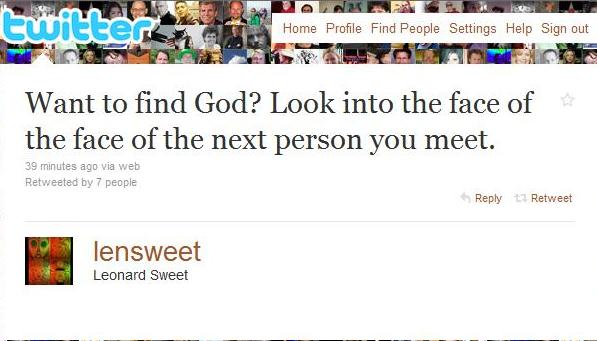GIVING LEONARD SWEET A NUDGE
By Ken Silva pastor-teacher on Sep 13, 2010 in AM Missives, Current Issues, Emergence Christianity, Emergent Church, Features, Leonard Sweet
 …always learning and never able to arrive at a knowledge of the truth. (2 Timothy 3:7)
…always learning and never able to arrive at a knowledge of the truth. (2 Timothy 3:7)
Sweet Hegelian Dialetic Double-Speak
In Apprising Ministries articles like Leonard Sweet, Frank Viola, And The Third Way and Leonard Sweet, Frank Viola, And Mystic Meister Eckhart I’ve shown that the man-centered semi-pelagian theology of Leonard Sweet—beyond question a leading theologian within the sinfully ecumenical neo-liberal cult of the Emerging Church in its early days—remains the same, despite his claims to the contrary.
It’s also very likely that Sweet, along with his co-author Viola, are actually using a play on words with the title of their recent book Jesus Manifesto (JM), as in Jesus Manifest-o. Previously the Research team at the fine online apologetcis and discernment ministry Herescope brought out in The Other Side of Emergent: The New Apostolic Reformation:
Sweet and Viola’s book, Jesus Manifesto, is subtitled “Restoring the Supremacy and Sovereignty of Jesus Christ,” and it pushes the envelope on redefining Jesus, including “You can be a Jesus Manifest.” A quick glance at the lineup of key endorsers for this book includes a list of who’s who in Emergent, the Latter Rain cult, neoevangelicalism and the New Apostolic Reformation.
In recent posts on this blog we have noticed that emerging church leader Leonard Sweet has links to the NAR. The co-author of his book, Frank Viola, also has roots in the NAR… the aberrant beliefs of the New Apostolic Reformation are nearly identical to those of the emerging church movement in some of the following ways:
- The same Gnosticism, mysticism and altered states of consciousness. The belief that we are evolving to a higher order body of believers here on earth, and that if we would just jump through various mystical or restructuring hoops, paradise or “culture” would be renewed…
- The idea that we are somehow responsible for bringing back Jesus either literally and physically, or that we are evolving or “incarnating” into little christs and/or one big cosmic Christ. (Online source)
Sweet and Viola use the mystic Meister Eckhart in chapter four of JM in order to attempt to make this point: God is nearer to me than I am to myself. This would only be true for the regenerated Christian; and later Eckhart’s brought in again to try and establish the mystic belief of some alleged “true self” as Eckhart is cited as saying: “No one can know God who does not first know him/herself.” In a footnote in the back of the book we’re told Eckhart actually said: “How can man know that he knows God, if he does not know himself.” But this is merely the kind of nonsensical i.e. irrational Eastern philosophy enjoyed by mystics.
The Christian knows the Scripture teaches that no one can know God without Christ. You should know that Meister Eckhart was even considered heretical by the apostate Church of Rome, whom he served spreading its non-gospel in the antibiblical Dominican monastic tradition. Eckhart, like all classic mystics, was a universalist. In fact, in his latest book Emerging Church leader Samir Selmanovic, who is also a universalist known for his “interspiritual” work, tells us:
Meister Eckhart said that our religions are like houses. Each house has a trap door somewhere down in the basement, and if we go deep enough, we will fall through the trap door into a river that flows beneath all of us. Beautiful, I thought.[1]
Translation: Eckhart is talking about what’s commonly called “a spark of the divine,” which is supposedly within each “house”; i.e. all of mankind, and the flowing “river” is God.[2] Eckhart also clearly contradicts God’s Word in Scripture with a denial of the doctrine of regeneration when he teaches, “Every creature is full of God and a book about God.” That Leonard Sweet himself believes this is easily confirmed in the tweet Sweet sent May 12 of this year, which follows below:
So his theology hasn’t changed despite what he said in his rather patronizing A Response to Recent Misunderstandings filled with postmodern Humpty Dumpty language; the truth is, Christian missionary Sandy Simpson of the respected online apologetics and discernment ministry Deception In The Church put together Leonard Sweet Quotes, and nothing he quotes Sweet as saying there, or in my Emergence Christianity: Quantum Shift To Panentheism, has been retracted. Along these lines Christian apologist Chris Rosebrough, host of the popular Fighting for the Faith program on Pirate Christian Radio wrote:
From Foucault to Derrida, John Franke to Leonard Sweet, Brian McLaren to Doug Pagitt, Pete Rollins to Tony Jones all of these men are disciples of and dealers in the irrational philosophies of such men as Hegel, Feuerbach, Marx, Nietzsche, and Heidegger.
Just like their 20th Century counterparts these philosophers and theologians are characterized not by their positive ideologies and theologies but by their strident attacks against rational thought, knowable transcendent truth, individual rights, individual salvation, transcendent morals, systematic theology, and the bedrock reasoning upon which all of the societal structures of Western Civilization are built,… (Online source)
Even The Title Of Leonard Sweet’s New Book Shows He’s Not Changed
If you’re thinking we get something different from Leonard Sweet in his new book, think again; the title’s clear enough: Nudge: Awakening Each Other to the God Who’s Already There. We don’t even get past the first page of chapter 1 before Sweet begins pushing us off-course. He writes, “Brace yourself. This book is set to revolutionize your understanding of evangelism.”[3] Indeed, we are going to be fed a different, and quite wrong, understanding of the Gospel.
As Sweet gets set to discuss “evangelism,” which he says “changes me as much as anybody,” he simply sets aside the Protestant Reformation by telling us about a Roman Catholic friar who “returned to his monastery after an Ignatian thirty-day retreat.” Sweet goes on:
Over granola the next morning, he was interrogated by a grumpy old member of the community who complained. “We’ve been working like slaves while you’ve been swanning around doing nothing! And Look at you! You don’t look any different.”
“You’re quite right, I probably don’t,” was the reply. “But you do.”[4]
Since the friar in the story was supposedly changed in the way he now saw his community, the implication is clear; Sweet would have us believe that “after an Ignatian thirty-day retreat” this friar was changed due to Sweet’s re-defiintion of “evangelism.” For you see, he doesn’t mean evangelism as preaching the genuine Gospel of repentance and the forgiveness of sins in the Name of Jesus Christ; this becomes obvious as he next incorrectly defines repentance:
Jesus’ last words in the Gospel of Luke are these: “Go out and proclaim repentance and the forgivness of sins.” But a biblical understanding of repentance is not red-faced anger at other people’s sins but red-faced embarrassment at my own brokenness and complicity in the evils and injustices of the world. Proclaiming repentance is as much about reminding me of my waywardness as it is about setting other people straight.[5]
Because this man-centered preaching does play well to people’s itching ears, one can almost hear the applause. However, God tells us that true Biblical repentance involves godly grief over one’s sin against God Himself, and this produces a repentance and salvation without regret; whereas worldly grief produces death (2 Corinthians 7:10). By focusing upon worldly grief, i.e.”evils and injustices of the world,” Sweet manages to get repentance exactly backward.
As far as repentance being “as much about reminding me of my waywardness as it is about setting other people straight,” this is another popular man-centered myth, which does have an element of truth. Yes, Christians also need to repent of our sins; however, from Peter’s example in Acts 2, while in the context of his “proclaiming repentance,” notice that he clearly reminds his audience of their “waywardness”; and after using the Law to convict them Peter then shares the Gospel with them as their way to get “straight” with God.
In the end, Leonard Sweet is just another faulty product produced by the Church Growth Movement and its focus on attempting to come up with a type of Christianity the world will find appealing. This is unmistakable when Sweet tells us in Nudge:
When I am engaging with people of other religious faiths, I find myself unable to commit to their conclusions or agree with their assessments. Yet at the same time I come away encouraged by spiritual truths found in their traditions, thrilled by new insights into my own faith, and more passionate than ever about being a disciple of Christ. [6]
Sweet’s patronizing statement about finding himself being “unable” to”commit” to the “conclusions” of other religions aside, the genuine Christian minister would know that these people are actually blind to the spiritual truths found in Holy Scripture (c.f. 1 Corinthians 2:14); and as such, he would hardly be “encouraged” by their idolatrous religions. A real minister of the Gospel of Jesus Christ would know that what pagans sacrifice they offer to demons and not to God (1 Corinthians 10:20).
And so, Leonard Sweet’s earlier statement about “misunderstandings” now rings even more hollow; because as I just showed you here from Sweet’s latest book Nudge, his books and teachings remain filled with this mystical theology and its near pelagian view of mankind.
________________________________________________________________________________
Endnotes:
[1] Samir Selmanovic, It’s Really All About God: Reflections of a Muslim Atheist Jewish Christian [San Francisco: Jossey-Bass/Wiley, 2009], 262.
[2] I refute this Biblically in Understanding The New Spirituality: God Indwells Mankind.
[3] Leonard Sweet, Nudge: Awakening Each Other to the God Who’s Already There [Colorado Springs: David C. Cook, 2010], 27.
[4] Ibid.
[5] Ibid., 27, 28.
[6] Ibid., 28.
See also:
LEONARD SWEET AND HIS QUANTUM SPIRITUALITY
LEONARD SWEET TWEET ON HOW TO FIND GOD
EMERGING CHURCH THEOLOGIAN LEONARD SWEET AND CALVARY CHAPEL OF ALBUQUERQUE
CONCERNING LEONARD SWEET OF THE EMERGING CHURCH AND CHRISTIAN EDUCATION
EMERGENCE CHRISTIANITY: QUANTUM SHIFT TO PANENTHEISM
POSTMODERNISM IS SINFUL AND NOT COMPATABLE WITH CHRISTIANITY
